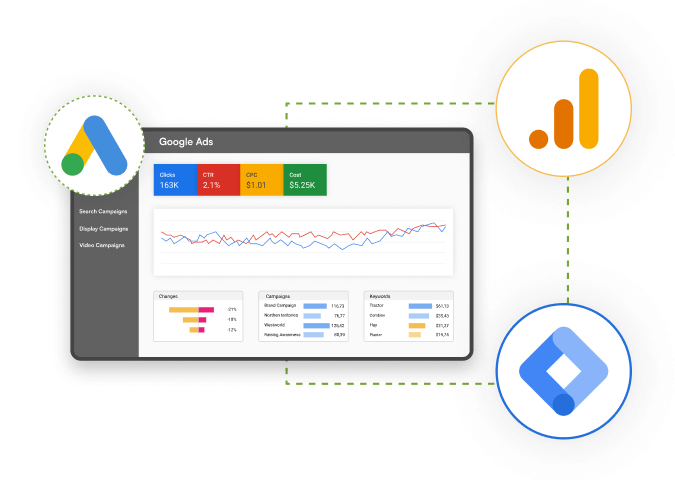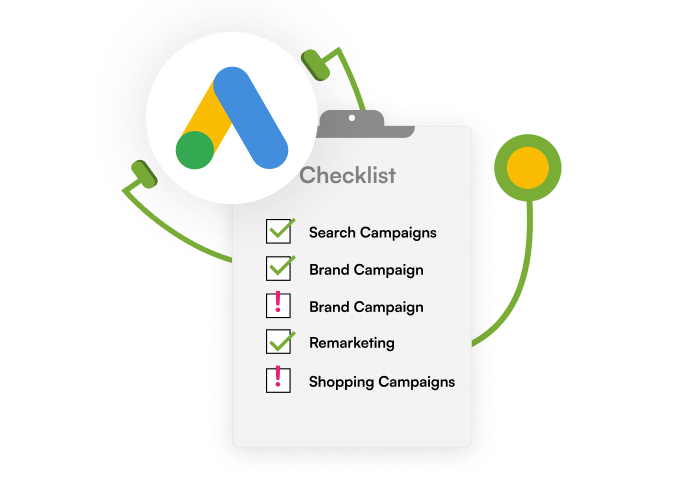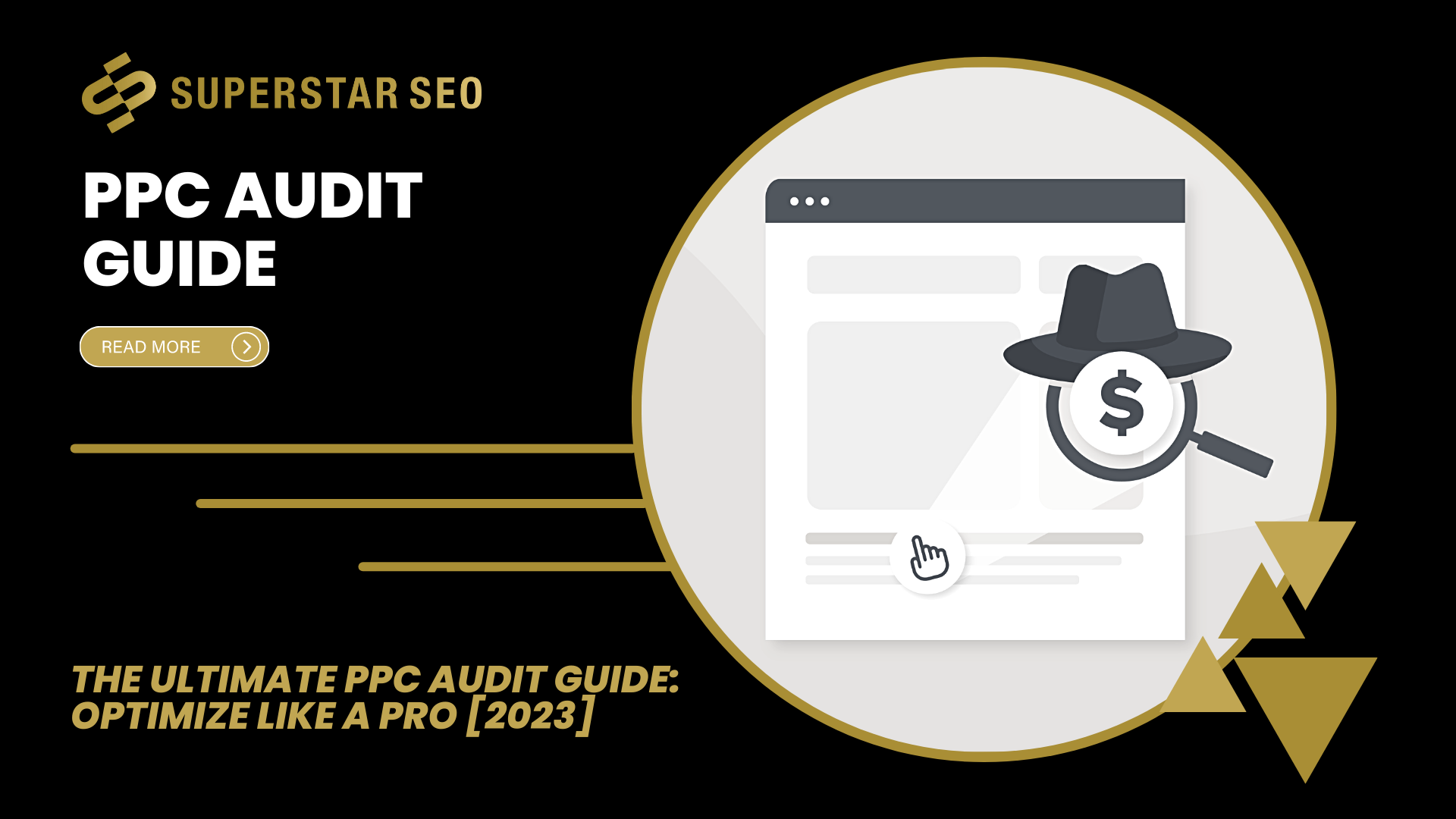The Ultimate PPC Audit Guide: Optimize Like a Pro [2025]
Are you tired of your PPC campaigns underperforming despite your hard work and dedication? Fear not! Because today, we’re talking about the ultimate solution to all your PPC woes – one of the best PPC audit guides.
Yes, you heard that right…
After all, 96% of companies spend money on search ads, so it’s crucial to know where your money is going.
We’re about to unravel the mystery behind PPC audits and why they are crucial for your campaign’s success.
What Is a PPC Audit?
PPC audit is a process of evaluating the health and effectiveness of your pay-per-click advertising campaigns.
Think of it as a thorough check-up for your campaigns, like visiting a doctor but for your ads.
And just like a doctor’s visit, a PPC audit can save you from some major headaches down the line.
For instance, imagine you’re running a PPC campaign, and you’re pouring all your hard-earned cash into it, expecting a good return on investment.
But to your surprise, the results are not what you hoped for.
Your ad spends are high, and conversions are low. What could be the problem?
This is where a PPC audit comes in. Evaluating your PPC efforts helps in organizing and analyzing campaign data to assess performance and inform strategic decisions.
By conducting an audit, you can identify areas where you’re overspending, underperforming, or simply missing out on opportunities.

A Simple PPC Audit Checklist
When it comes to conducting a PPC audit, there are certain checkpoints you need to tick off to ensure that your campaigns are in top-notch shape.
Keep in mind that almost all PPC audits put a strong focus on the Google Ads network because of its market domination.
By the end of 2023, Google’s share of digital advertising revenues worldwide is projected to amount to 27.5%.
So, without further ado, let’s dive into the PPC audit checklist:
1. Are You Tracking Conversions Properly?
This is the bread and butter of PPC campaigns. If you’re not tracking your conversions accurately, you’re basically driving with your eyes closed. Make sure your conversion tracking is set up correctly and that you’re measuring the right metrics to determine your ROI.
2. Are Campaign Settings Set Correctly?
Your Google Ads campaign settings can make or break your campaign’s success. Make sure your PPC targeting options, ad delivery, ad rotation, network setting, mobile bid adjustment, and bidding strategies are all set up correctly. A small mistake in any of these areas could lead to wasted ad spending and poor results.
3. Do All Ad Groups Hold Less Than 20 Keywords?
The age-old adage “less is more” rings true when it comes to ad groups. When it comes to identifying the proper keywords for your PPC campaign, the general rule of thumb is to have no more than 15-20 keywords per ad group. This ensures that your ads are highly relevant to the search queries and that you’re not diluting your ad group’s focus.

4. Are You Using No More Than Two to Three Ad Variations per Ad Group?
Variety is the spice of life, but too much variety can be overwhelming. Stick to two to three ad variations per ad group and test which ones perform best. This will help you optimize your ads and improve your click-through rates.
5. Is Ad Messaging Consistent and Error-Free?
Your ad copy should be consistent across all ad variations and free of errors. Make sure your ad messaging is aligned with your landing pages and that it’s appealing to your target audience.
6. Is the Negative Keyword List Complete?
Negative keywords are essential for weeding out irrelevant search queries and preventing your ads from appearing for the wrong searches. Make sure you have a comprehensive negative keyword list to avoid wasting your ad budget on irrelevant clicks.
7. Are You Using PPC Extensions That Are Appropriate Fits for Your Business?
PPC extensions, such as callouts and site links, can help improve your ad’s visibility and click-through rate. However, make sure you’re using extensions that make sense for your business and that you’re not overdoing it with too many extensions.
The benefits of doing a PPC audit
1. Find Wasted Ad Spend
One of the biggest benefits of a PPC audit is finding wasted ad spend. Many Google Ads accounts have budget leaks due to irrelevant keywords, poorly optimised ad groups or misaligned targeting. By looking at your ad campaigns you can:
- Find broad match keywords that trigger ads for irrelevant search terms.
- See ineffective ad placements on the search network or display network.
- Stop wasting spend on low performing ad variations or irrelevant ad content.
Removing wasted spend means your budget is working on more effective strategies that deliver results.
2. Target Better to Reach Your Audience
Keyword targeting and ad relevance are key to reaching your target audience. A PPC audit looks at how your ad groups and campaign settings match up with your business goals so you can:
- Use negative keywords to block out irrelevant traffic.
- Refine audience targeting based on Google Analytics data.
- Make sure ad copy and ad extensions speak to your potential customers.
Targeting better means better PPC.
3. Find New Keyword Opportunities
Expanding your PPC campaign often relies on finding relevant keywords that capture new opportunities. A PPC audit will find:
- High performing broad match keywords to drill down into.
- Missed opportunities for shopping ads or structured snippets.
- Gaps in existing campaign performance to fill with new PPC keyword ideas.
Adding these keywords into your campaigns means more visibility and more opportunity to reach new audiences.
4. Optimize Ad Positions
Your ad placement and quality score matter. A PPC audit looks at:
- How your ad is performing on the search network and display network compared to competitors.
- Whether you can adjust your bidding strategy to improve your ad.
- Opportunities to improve ad assets like headlines, descriptions and ad text to get more engagement.
Optimizing ad positions means more visibility and your ads will perform better in competitive environments.
5. Fix Inefficiencies to Get More From Your Campaigns
Inefficiencies in your PPC ads – like poorly structured ad groups or missing conversion tracking code – can waste resources and reduce ROI. Evaluating and improving your PPC efforts through a PPC audit looks at the structure of your Google Ads account or Bing Ads to give you:
- Better landing pages for higher conversions.
- More ad extensions for more user engagement.
- Conversion tracking that actually measures results.
By fixing these you’ll have a better campaign and more from your PPC.
6. Get Your PPC Audit Report
A full PPC audit report will give you a clear view of your campaign. It will include:
- Ad accounts – ad relevance and ad placements.
- Recommendations for implementing a structured audit process moving forward.
With a PPC audit checklist, businesses can maintain consistency in optimizing their campaigns over time.
How often should you conduct a PPC audit?
The frequency of a PPC audit depends on the complexity, size, and goals of your PPC campaigns. In general, it’s recommended to conduct a PPC audit every three to six months.
Here are some reasons why you should audit your PPC campaigns:
- Avoid strategic missteps
Auditing your PPC campaigns less than three months apart may not provide enough relevant data, while auditing more than once a year can be difficult to assess.
- Document and measure changes
Make sure to document and measure any changes you make to your PPC campaigns so you can determine which ones are successful.
Some things you can include in your PPC audit are:
- Reviewing your bids
- Analyzing your conversion and click-through rates
- Assessing your keyword targeting
- Checking and logging your quality score
- Looking at your ad content
- Documenting your budget
- Downloading the data
- Choosing a date range
Bottom Line
There you have it, folks – the PPC audit checklist that will take your campaigns from “meh” to magnificent!
And if you’re looking for some handy PPC audit tools, there are plenty of options available, such as SEMrush, AdEspresso, Google Ads Editor, etc., etc.
Just a simple search online will give you a total list of these tools.
So, good luck with your campaigns!





